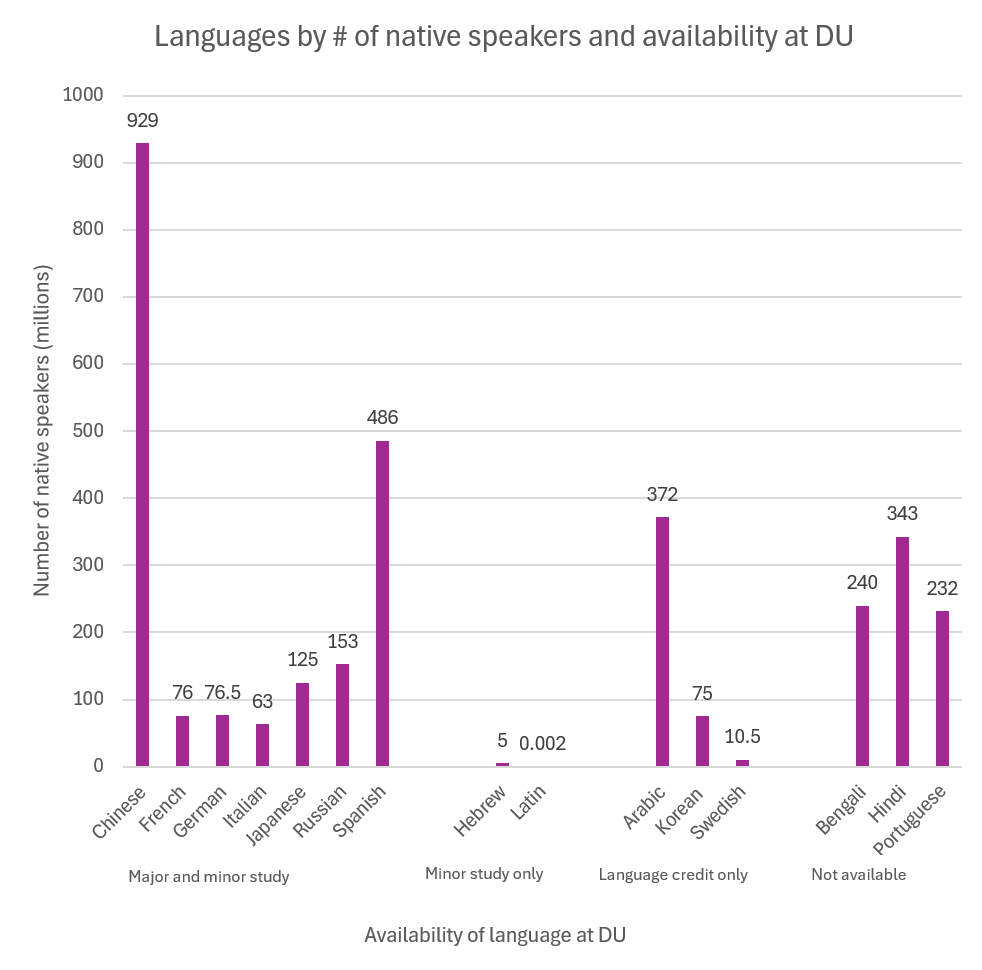Portuguese is spoken by 232 million people as their first language. It is the 7th most spoken language in the world, based on the number of native speakers. Native speakers of Portuguese live on 4 continents: South America, Africa, Asia and Europe, and it is the official language of Angola, Brazil, Cape Verde, East Timor, Guinea Bissau, Macau, Mozambique, Portugal and São Tomé and Príncipe.
And yet, Portuguese is not offered as an available language at DU for major or minor study, or even for language credits required within the common curriculum. There is currently only one way that DU students can take Portuguese classes and it is not in a traditional classroom setting—meaning students only actively practice the language twice a week.

The Language For You! program is a mainly self-directed study option where students meet weekly with a language tutor and once weekly with other students learning independently to practice. For You! costs $400 to enroll but students do not receive credit and are responsible for the vast majority of their own learning. Many languages will be offered through this program in the Spring Quarter, but Portuguese is not one of them.
A first-year student, Mason Mireles, expressed his frustration about the lack of opportunities and inaccessibility of studying Portuguese at DU. “Paying extra for a class that does not receive credit is simply not feasible for my financial situation, nor with my academic, extracurricular and volunteer schedule,” he said.
There used to be a program called Directed Independent Language Study (DILS), which was a self-guided language course that any student could enroll in for elective credits. This program cost the same amount as the credits for any other class at DU, but has been inactive for several years now, though DU’s website still lists it as available.
The Associate Director of the Center for World Languages and Culture (CWLC), Ethel Swarley, explained that the program is temporarily inactive because of lack of resources, but that they hope to get it up and running once again. “The DILS program was not canceled, but it was allowed to go ‘dormant’ until such time [when] we have sufficient budget, staff and enrollment requests to revive it,” Swarley said.
Although For You! is not offering Portuguese next quarter, they have offered it in the past. Swarley agrees that it is valuable for students to be able to take initiative to learn this language. “Portuguese is a language that I do think is important for us to offer,” Swarley said. From students to staff, everyone seems to be in agreement that Portuguese should be an available language for students, so why won’t the administration at DU set aside money in their budget to make this happen?
Of the languages that are offered through the College of Arts, Humanities and Social Sciences (CAHSS), 9 of 12 have significantly fewer native speakers than Portuguese—the only languages with more speakers being Arabic, Chinese and Spanish. The examples that show the discrepancy between language popularity and course availability at DU most strikingly are Hebrew, Latin and Swedish.
Approximately 5 million people speak Hebrew as their first language, and about 9 million people speak it in total. Latin is a dead language and there are no native speakers, so estimates of fluent speakers vary greatly, but a website for learning Latin estimates that 2,000 people speak it fluently. Both of these languages are not only offered for Common Curriculum credit but also available for minor study. Only 10.5 million people speak Swedish as their first language and this language is available for Common Curriculum credits through online classes.
All of this is by no means to say that these languages should not be taught; it simply questions how languages are selected to be offered at DU.
The inequality doesn’t stop at Portuguese. Arabic, Hindi and Bengali are examples of languages with more total speakers that aren’t offered at DU, or are only offered online in the case of Arabic. There is a strong case for all of these languages to be made available for language credit or as minor/major topics of study.
Comparing DU with other prestigious universities in Colorado shows that the location and availability aren’t the driving factors for the decision not to offer Portuguese. At CU Boulder, the Department of Spanish and Portuguese offers a minor in Portuguese, a double-track major in Spanish and Portuguese, and a Master’s in Spanish and Portuguese Studies. The Spanish and Portuguese Department at Colorado College offers major and minor specialization in Portuguese, along with other cultural studies options.
When CU Boulder students were asked why they studied Portuguese, one said that, “Some of my best friendships and professional opportunities in college were possible only because I chose to study Portuguese. Speaking Portuguese will bring a world of spectacular people and excitement into your life.” Another student said, “I can travel to Portuguese-speaking countries spread out on four continents! Better question: Why not?”
Mireles expressed similar sentiments around the utility of the language, explaining that he wanted to speak Portuguese because he specializes in International Studies, among other things.
“Offering Portuguese as a language to study for credit would better equip students to understand the historical relevance of Brazil-U.S. relations as that of Brazil being a stable partner and important strategic country in the region…learning Portuguese is fundamental in supporting me to engage further in these issues,” Mireles said.
DU’s Department of Spanish Language, Literary and Cultural Studies (SLLC) is vast and described on the website as multidimensional, but why doesn’t it include Portuguese as part of the program, or even as an elective class that can count for the major/minor?
A Brazilian professor of history at DU, Dr. Rafael Ioris, explained that he has tried to encourage the offering of Portuguese within the Spanish department, but the efforts never gained traction.
Administration’s reluctance to offer Portuguese seems to come from ignorance of the utility of the language and an inability to consider the feasibility of the idea. “It’s a bias largely out of a lack of considering the idea [to offer Portuguese] and the idea that if people speak Spanish they can get by…I would just call it uninformed,” Dr. Ioris said.
Mireles agrees that DU’s failure to offer Portuguese classes stems from ignorance around the importance of the language. “DU embraces the idea that Portuguese is not a widely spoken language despite the opposite being true,” Mireles said.
There are several possibilities for how Portuguese could be incorporated at DU, and there is no lack of interest among professors or students. DU could take on department restructuring to mirror CU Boulder or Colorado College, or even just offer a Portuguese class for Spanish speakers. Dr. Ioris thinks this change would be achievable if the university’s administration took the initiative.
“The department of Spanish could include one or two opportunities to learn Portuguese, there are enough resources that they could at least try…We’re not too far away from making it possible if the higher-up people were to make that decision,” Dr. Ioris said.
Dr. Ioris said that through the years, many students have approached him inquiring about Portuguese and expressing interest in learning the language through DU. “There is and there would be sufficient demand for Portuguese to be offered and I would definitely support that idea… I think there is this diffused interest and what we need is a focal point to bring it together.”
A second-year student, Gracie Clifford, was very disappointed when she learned that Portuguese wasn’t available for a language sequence at DU. She expressed frustration that learning a language like Portuguese isn’t valued at DU, despite it being so significant globally.
“Portuguese matters just as much as Spanish. I was also hoping to learn Portuguese because my ideal trip abroad would be to Brazil, and it would have been ideal to learn through immersion… Portuguese is thought of by many to be unnecessary to learn, even though the biggest and most populated country in South America’s official language is Portuguese,” Clifford said.
DU’s failure to provide adequate opportunities for students to learn Portuguese is not only limiting to students, but it minimizes the importance of Brazil and other Portuguese-speaking countries in the world’s socio-political reality.
“There are many reasons, from music to politics, that justify paying attention to Portuguese in the world of today, and [as time goes on], Brazil will be even more present and renowned,” Dr. Ioris said.
The interest in learning Portuguese at DU is undeniable, yet the administration has yet to significantly consider implementing Portuguese classes.
“It is obvious the immense benefits students would be provided if DU offered Portuguese as a language to study for credit. What is DU waiting for? It is time for both students and faculty to speak up and step up to create this important change,” Mireles said.











